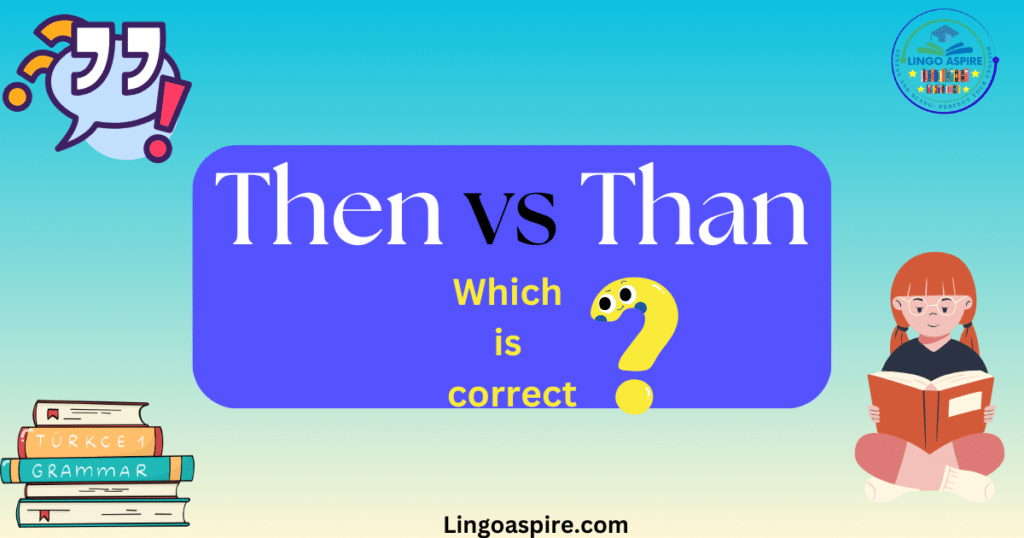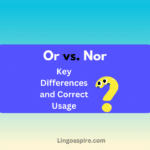When learning English, it’s easy to mix up Then and Than. These two words sound similar but are used in very different ways. Understanding the difference between them is crucial for polished writing and clear communication. In this post, we’ll explore the meanings of these two words, how to use them correctly, and how to avoid common mistakes. If you’ve ever been confused by misused words or wondered about grammar tips for correctly using these homophones, keep reading!
What Does “Then” Mean?
The word “then” is often used to refer to time or sequence. It can show what happens next in a series of actions, or it can describe a specific point in time. For example, when you say, “We went to the store, and then we had dinner,” “then” is showing the order of events. It tells us what happens after something else.
One of the most common ways to use “then” is in describing actions that follow one another in a clear sequence. For example, “First, we ate breakfast; then we walked to the park.” Here, “then” shows us the time that followed the first event, clarifying the order in which things happened. This is especially helpful when you are explaining time expressions or laying out steps in a process.
Then can also be used in conditional sentences. For example, “If you study hard, then you will pass the test.” Here, “then” shows the result of an action, connecting the condition and the outcome. In this case, if one thing happens (studying hard), then another thing will follow (passing the test).
Examples of “Then” in Sentences
- “I will finish my homework, and then I will go outside.”
- “He was tired, so he went to bed right then and there.”
- “Back then, life was much simpler.”
- “I’ll call you back then.”
The use of “then” isn’t restricted to the present. It can also describe actions that took place in the past or future. For instance, you might say, “We traveled the world back then,” or “I will meet you there then.”
Common Idioms with “Then”
There are many English idioms that include the word “then.” These expressions help make conversations more lively and interesting. Here are a few popular examples:
- “Right then and there” – This means immediately, without delay. Example: “He made a decision right then and there.”
- “Back then” – Refers to a time in the past. Example: “Life was different back then.”
- “From then on” – Means from that point forward. Example: “She promised she would help me, and from then on, she kept her word.”
What Does “Than” Mean?
On the other hand, “than” is used for comparisons. It helps us compare two things, ideas, or actions. For example, when you say, “She is taller than her brother,” you are comparing their height. Similarly, you might say, “This book is more interesting than the movie.” In both cases, “than” is used to show that one thing is different from or better than the other.
Than is often used with adjectives or adverbs, but it can also be used with pronouns. It plays an important role in sentences that deal with comparative statements. For example, “She runs faster than I do.” Here, the comparison is between the speed of two people, and “than” is essential to express that comparison.
Than is also found in many English idioms and expressions that make comparisons. A well-known example is “better late than never,” which suggests that doing something late is better than not doing it at all. Here, “than” helps express the comparison between “late” and “never.”
Examples of “Than” in Sentences
- “This cake is better than the other one.”
- “She runs faster than I do.”
- “He is more talented than his friends.”
- “The weather is warmer than it was yesterday.”
In each of these examples, “than” highlights the difference between two things—be it the taste of the cake, the speed of the runner, or the talent of the individuals. It’s important to recognize that “than” is always used when comparing two things. Without it, a comparison wouldn’t be clear.
Common Idioms with “Than”
There are also many well-known idioms in English that use “than.” These phrases help emphasize the meaning of the comparison. Here are a few you might hear:
- “Easier said than done” – Meaning something is harder to do than to talk about. Example: “The idea sounded great, but it was easier said than done.”
- “Better late than never” – A reminder that it’s better to do something later than not at all. Example: “I missed the deadline, but better late than never.”
- “More fun than a barrel of monkeys” – Used to describe something that is extremely fun. Example: “That party was more fun than a barrel of monkeys.”
When to Use “Then”
You should use “then” when you’re talking about time or sequence. If you want to say something happens next in a series, “then” is the right word. For example, “First, I did my homework; then I went for a walk.” Then also comes in handy when discussing results or consequences of something, like in conditional sentences: “If you study, then you will improve.”
You can also use “then” to refer to a specific moment in time. For example, “He was upset back then.” In this case, “then” refers to a past time. The word can even be used for idioms like “right then and there,” which means something happened immediately.
Another important aspect of “then” is its use in cause and effect relationships. For instance, you might say, “If you complete your assignment, then you can relax for the rest of the day.” In this case, the word “then” indicates the effect or outcome of completing the assignment.
When to Use “Than”
You should use “than” when you’re comparing two or more things. For example, “This movie is better than the last one.” When you’re comparing things like size, speed, or value, “than” is the correct word. You can also use “than” to compare actions: “I work harder than my colleagues.”
Than is also used in some idioms to compare situations, such as “easier said than done” or “better late than never.” In these idiomatic expressions, the word than helps show that one thing is harder, better, or more difficult than the other.
It’s important to note that “than” can be used not only with adjectives and adverbs, but also with pronouns. For instance, you can say, “She is taller than me.” Here, “than” compares the height of two people.
How to Remember the Difference Between “Then and Than”
One way to remember the difference between “then” and “than” is by focusing on the letters in each word. “Than” has an A, just like the word “comparison.” When you compare things, you use “than.” On the other hand, “then” is used for time and sequence. It’s linked to when things happen, so think of “then” as referring to a specific point in time or sequence of events.
Additionally, if you’re unsure, think about “than” being related to “comparison,” and “then” being about “time.” These connections will help you use each word correctly.
Common Mistakes and How to Avoid Them
A lot of people confuse “then” and “than” because they sound similar. But their meanings are very different, so using them incorrectly can lead to confusion in writing. For example, saying, “I am taller then you” is a mistake. Since you’re making a comparison, the correct word is “than”. The right sentence should be: “I am taller than you.”
Another common mistake is using “than” in time-related sentences. For instance, “We went to the park than we went to the mall” is incorrect. The right sentence would be: “We went to the park, then we went to the mall.”
To avoid these errors, always check the context of the sentence. If you’re making a comparison, use “than.” If you’re talking about time or sequence, use “then.”
Tips for Avoiding These Mistakes
- Pay attention to whether you’re discussing time or comparison.
- Practice using each word in different sentences.
- Check for spelling errors while proofreading.
Commonly Misused Words: “Then” and “Than”
Sometimes, the difference between “then” and “than” can be tricky, but understanding the parts of speech they represent can help. “Then” is an adverb that refers to time or sequence, while “than” is a conjunction used in comparisons. Knowing this will help clarify when to use each word.
Here are some other examples of commonly misused words in English:
| Word | Meaning | Correct Usage |
|---|---|---|
| Then | Refers to time or sequence. | “I will finish my work then go home.” |
| Than | Used for comparisons. | “This test is harder than the last.” |
| There | Refers to a place. | “We are going there now.” |
| Their | Possessive form of they. | “This is their book.” |
Grammar Help: Polishing Your Writing
Knowing when to use “then” and “than” is essential for clear communication. Proper grammar helps you express your ideas more effectively and avoid confusion. By understanding the parts of speech and practicing with examples, you can avoid misused words and improve your writing skills.
If you’re unsure about a word choice, don’t hesitate to use tools like Grammarly or consult a dictionary. These tools help you identify errors and ensure correct word usage.
Conclusion: Mastering “Then” and “Than”
By now, you should have a clear understanding of the difference between “then” and “than.” To summarize: use “then” when talking about time or sequence, and use “than” for making comparisons. Practice makes perfect, so keep using these words in sentences to gain confidence in their correct usage.
Remember, polished writing is all about clarity and precision. Whether you’re writing an essay, email, or even a text message, using the right word helps you communicate more clearly. So, take some time to practice, and soon enough, you’ll be using “then” and “than” like a pro!
This article should help clear up any confusion about “then” vs. “than”, providing grammar help and practical advice. So, start practicing today!
Sources
- Merriam-Webster: This source offers clear definitions and examples, emphasizing that “than” is used for comparisons, while “then” relates to time or sequence.
- Dictionary.com: This article provides a concise overview, highlighting that “then” indicates time or consequence, and “than” is used for comparisons.
- Grammarly: This resource explains the usage of “than” and “then” in different contexts, offering examples and tips to avoid common mistakes.







